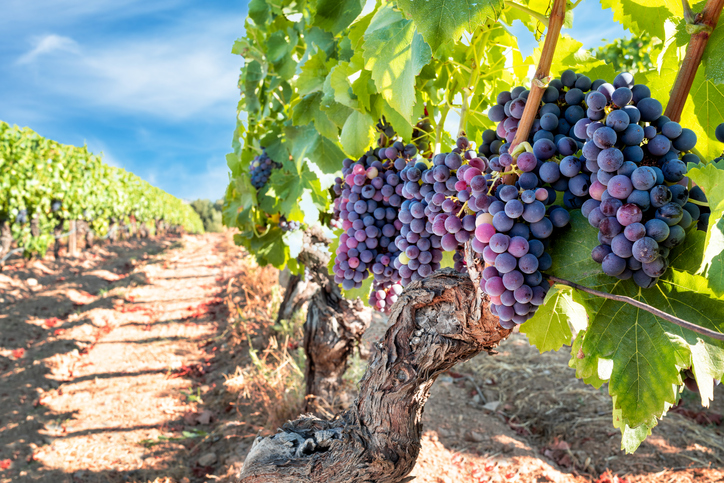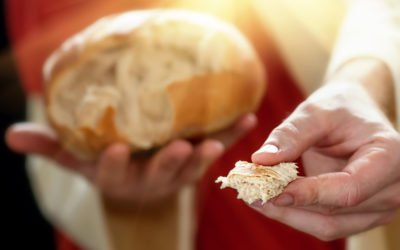John 15:1–6 (NKJV)
1 I am the true vine, and My Father is the vinedresser.
2 Every branch in Me that doesn’t bear fruit He takes away; and every branch that bears fruit He prunes, that it may bear more fruit.
3 You are already clean because of the Word which I have spoken to you.
4 Abide in Me, and I in you. As the branch cannot bear fruit of itself, unless it abides in the vine, neither can you, unless you abide in Me.
5 I am the vine, you are the branches. He who abides in Me, and I in him, bears much fruit; for without Me you can do nothing.
6 If anyone doesn’t abide in Me, he is cast out as a branch and is withered; and they gather them and throw them into the fire, and they are burned.
This passage is often used to teach that Christians can lose their salvation. It’s easy to see why they would think that way, especially when you look at verses 2 and 6: “Every branch in Me that doesn’t bear fruit He takes away”; “anyone who doesn’t abide in Me, he is thrown into the fire, and burned.” In particular, the phrase “in Me,” which is used twice, apparently suggests a loss of salvation. The branches that don’t bear fruit—the signs of salvation—are gathered and “thrown into the fire,” a clear symbol of eternal judgment. The question is though, since these hell-bound branches were initially “in” Jesus, does that mean they represented true believers who lost their salvation? Is being “in” the vine in this parable the same thing with being saved? I would suggest the answer is no and I feel this is the correct conclusion for a few reasons. First, the Greek word translated into the verb “takes away” in Verse 2 is airo, which actually means “to lift from the ground” or “to lift with a view of carrying.” The Passion Translation (TPT) of the Bible seems to provide a more accurate rendering of that word in the first two verses of John 15:
John 15:1–2 (TPT)
1 I am a true sprouting vine, and the farmer who tends the vine is my Father.
2 He cares for the branches connected to Me by lifting and propping up the fruitless branches and pruning every fruitful branch to yield a greater harvest.
 The same Greek word airo is used in John 5:8 for the verb “take up” when Jesus tells the lame man from the pool of Bethesda to take up his bed and walk. Then, in Matthew 16:24, when Jesus says, “If anyone wants to come after me, let him deny himself and take up his cross and follow me,” the airo is used for the verb “take up” again. As a matter of fact, every other instance of this Gr. word airo in the New Testament is translated as “lift up” or “take up” except in John 15:2, where it is interpreted as “cut off” or “remove,” and I have an explanation for why. The theological “lenses” of the translators really matters. All of us wear certain “lenses” of interpretation when we read the Scripture, whether we are aware of it or not. I hear sometimes believers saying, “I only obey what the Word says” when in fact they obey whatever they think the Word says most of the times. And what they say the Word says is filtered through the “glasses” they use. Blessed are those who know what kind of glasses they use! So, I believe the translators chose to render airo as “cut off” or “take away” because of their theological understanding, but it should have been translated as “lift up.” Why? Because the vine is a creeper or a crawling plant. You often see a vinedresser picking up the branches from the ground and tying them up with strings to the pillars of the vine. If the branches sit on the ground in the dust, they don’t bear fruit. In this passage, Jesus is saying the Father lifts up every fruitless branch to help it bear fruit. He is not waiting for a given opportunity to cut people off, but to make them bear fruit. That is the Father’s job. Jesus is the vine and the Father God is the vinedresser Who is making sure we bear fruit.
The same Greek word airo is used in John 5:8 for the verb “take up” when Jesus tells the lame man from the pool of Bethesda to take up his bed and walk. Then, in Matthew 16:24, when Jesus says, “If anyone wants to come after me, let him deny himself and take up his cross and follow me,” the airo is used for the verb “take up” again. As a matter of fact, every other instance of this Gr. word airo in the New Testament is translated as “lift up” or “take up” except in John 15:2, where it is interpreted as “cut off” or “remove,” and I have an explanation for why. The theological “lenses” of the translators really matters. All of us wear certain “lenses” of interpretation when we read the Scripture, whether we are aware of it or not. I hear sometimes believers saying, “I only obey what the Word says” when in fact they obey whatever they think the Word says most of the times. And what they say the Word says is filtered through the “glasses” they use. Blessed are those who know what kind of glasses they use! So, I believe the translators chose to render airo as “cut off” or “take away” because of their theological understanding, but it should have been translated as “lift up.” Why? Because the vine is a creeper or a crawling plant. You often see a vinedresser picking up the branches from the ground and tying them up with strings to the pillars of the vine. If the branches sit on the ground in the dust, they don’t bear fruit. In this passage, Jesus is saying the Father lifts up every fruitless branch to help it bear fruit. He is not waiting for a given opportunity to cut people off, but to make them bear fruit. That is the Father’s job. Jesus is the vine and the Father God is the vinedresser Who is making sure we bear fruit.
Furthermore, Verse 2 of this passage says God, the Father, prunes every branch that bears fruit so that it will bear more fruit.
Moreover, the dust talks about serpent mentality. In the garden of Eden, God cursed the serpent, saying: “From now on, dust shall be your food.” Whenever the branch is in the dust, it does not bear fruit. Whenever we feed with what the serpent feeds itself, when the serpent’s food becomes the atmosphere of our living, we do not bear fruit. If we keep feeding on the lies of the enemy, we will not bear fruit. That is why God lifts us up and cleanses us by His Word—to bear fruit. Just because a couple has a legal marriage certificate does not necessarily mean they have a great marriage. The certificate validates the union, but life in the union is purely relational. A certificate does not give birth to babies. It is not the legal union that brings fruit, but the relational intimate union. Likewise, in our walk with Christ, it is our relational intimate union with Him that brings fruit and life.
The second reason I believe John 15 is not a passage about the possibility of believers losing their salvation is because metaphors are only meant to go so far. Jesus here is speaking in a parable. He uses an illustration to make a point. As with any picture or parable, one can take it too far. In His wisdom, Jesus uses an everyday image—especially for ancient Easterners—to make a spiritual point, that is, our continual spiritual fruition and growth here on earth. The picture of vines, branches, and gardening was a reference the commoner could understand. The whole thrust of John 15 is to prove Jesus is the source of all spiritual life. This is clear since the punch line is that bearing fruit comes only from staying in Jesus. Just as a branch separated from the vine will wither and die, so will people who are separated from Christ. In this context of fruitfulness, separation from the vine or Christ, as well as withering or death does not refer to being without God and unsaved, but to having certain parts of the whole body of truth, which is fully revealed in Scripture, “turned off” in our lives about what Christ has accomplished for us, what we have a right to, who we really are in Christ, and what our lives should look like. And this may be due to lack of knowledge, revelation and understanding because of wrong teachings or due to failure to keep the faith fresh and strong always in the areas where we have been enlightened. The Bible says in John 8:32 that we will know the truth and the truth will make us free. There is a truth about sanctification, about healing, about blessing, about walking by the Holy Spirit, etc. We can sanctify ourselves either through faith in the grace provided by Christ or through our own efforts. We can live either in healing and physical health through faith in what Jesus won on the cross or in fear and suffering. We can have a life that is prosperous and blessed by faith, or one dominated by poverty and want, or one in which we try to prosper only by our own efforts. We can make any life decision by letting ourselves be guided by the Holy Spirit or relying only on our human wisdom. In any area of life where we do not live by faith in the spiritual truth about us, there comes separation from the vine and partial fruit bearing or temporary cessation of fruiting, but not irreversible separation from God. Perhaps the summary statement of Jesus’s teaching is Verse 5: “I am the vine; you are the branches. He who abides in Me, and I in him, bears much fruit; for without Me you can do nothing.”
Third, the branches didn’t require attachment first. If one was to take the phrase “in Me” literally to refer to someone who is already saved, it creates another problem with the metaphor: how did the branches get attached to Jesus in the first place? If the branches represent people and attachment to the vine symbolizes salvation, then the branches should first be separated from the vine at the beginning of the metaphor since everyone is born apart from Christ and needs to put their faith in Him before salvation.
Let me give you an example to clarify. Imagine Bill is twenty-five years old when he believes in Jesus as His Savior. Using Jesus’s imagery, Bill was a dead and shriveled branch for twenty-five years before connecting with the vine. Yet Jesus’s parable completely glosses over any branches needing to be attached to begin with. If we consider the removal of fruitless branches a loss of salvation, then we must also notice that every branch started already attached to Jesus. This means everyone is already saved unless they depart from Jesus later. Yet this is not what Scripture teaches. Instead, the Bible says everyone begins apart from Christ and must be united to Him by faith. The reason this reality is not illustrated in Jesus’s metaphor in John 15 is because Jesus was not trying to make that point. Neither should we jam meaning into every detail of this parable in ways that betray the basic intended meaning.
Fourth, it doesn’t reconcile with the rest of Scripture. If Jesus meant to teach in John 15 that Christians can lose their salvation, we have a problem because other scriptures seem to say the exact opposite. Perhaps the most explicit text in the whole Bible on this issue is 1 John 2:19, which says:
1 John 2:19 (LEB)
19 They went out from us, but they were not of us; for if they had been of us, they would have remained with us. But they went out, in order that it might be shown that all of them are not of us.
John teaches that those who profess to be Christians but eventually walk away from their faith reveal they were never saved to begin with. Jesus Himself confirms this truth when He says the following about believers in John 10:28–29,
John 10:28–29 (NKJV)
28 And I give them eternal life, and they shall never perish; neither shall anyone snatch them out of My hand.
29 My Father, who has given them to Me, is greater than all; and no one is able to snatch them out of My Father’s hand.
In other words, once a Christian, always a Christian. These two passages and others teach this truth clear as the light of day.
Listen / Watch / Download
You can listen to the audio message of this article, watch the video message or download it in different formats (mp3 / mp4 / pdf) from the following link:
Session 8 – Abiding in the Vine (Saved for Eternity) – December 4th, 2023






